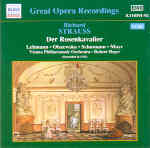This 1933 Rosenkavalier is a classic recording, one that should be in every opera collection. Returning to it after a long hiatus confirms its status. Lotte Lehmann’s Marschallin may be the best characterization on disc. Ditto for Elizabeth Schumann’s Sophie. Richard Mayr’s Ochs is in their class, and Maria Olszewska’s Octavian is only slightly below it. Since all recorded Rosenkavaliers have at least one weak link among the principals, this one takes the prize for the most consistent cast. You still may carp though: Schumann’s youthful freshness and Mayr’s mature boorishness remain wonderful; Olszewska is a bit short on impetuousness but otherwise is excellent; and good as she is here–especially in creating a rounded character–Lehmann’s voice in 1933 wasn’t as fresh as in her earlier days. This is confirmed by her 1927 recording of the Marschallin’s Der Zeit monologue, thoughtfully included among the excerpts provided as fillers. Robert Heger conducts briskly and the orchestra is adequate, but there’s no denying that Strauss’ rich orchestration is severely compromised by the dated sound, although Mark Obert-Thorn’s transfers are more vivid and wide-ranging than others I’ve heard.
This Rosenkavalier is correctly billed as an “abridged version”, meaning it’s more than mere excerpts but nowhere near the complete opera. The biggest cuts are the Marschallin’s levee including the Italian Singer’s aria, episodes before and after the presentation of the rose, and a huge chunk of the seduction scene at the inn. With almost half the opera missing, this makes for awkward discontinuities. But all the important scenes are left intact and the booklet has an extensive synopsis keyed to track numbers, so it’s possible to follow the plot developments even when they’re cut from the recording. Those heavy cuts are not the happiest of solutions, but they’re eminently understandable in the days when a note-complete Rosenkavalier was rare enough in the theatre and would have taken up a shelf of its own in heavy 78s.
As if giving us a well-transferred version of a classic opera recording weren’t enough, Naxos includes eight historic recordings of Rosenkavalier excerpts amounting to nearly three-quarters of an hour of added bliss. They include Richard Tauber’s 1920 Italian Singer’s aria (a bit rough vocally); the aforementioned 1927 Lehmann; an unidiomatic but spirited Italian-language duet featuring Conchita Supervia; and a pair of Ochs’ Hier lieg ich…Herr Kavalier scenes–one with Mayr in better voice than in the main event, the other with the incomparable Alexander Kipnis. The best surprise for me though, was several excerpts featuring Barbara Kemp’s gloriously sung Marschallin, including two 1928 live recordings from a Berlin performance. The inclusion of these added tracks alone justifies Naxos’ modest price, especially since many of the “fillers” include music cut from the full recording.
































